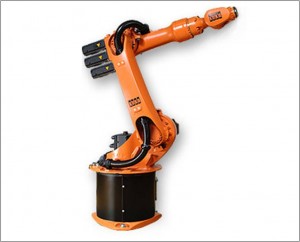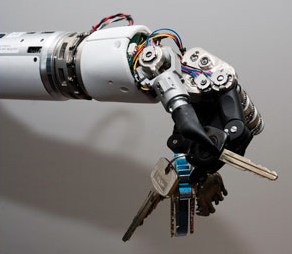or Mechatronic Engineering, humourously (but incorrectly) referred to as Megatronics at times. In Afrikaans Megatronika or Megatroniese Ingenieurswese. What is it? What can you do with it? When I started studying I didn’t know, after 5 years I think I have a vague idea. So below I’m going to post what I know.
In it’s simplest form it’s a combination of Mechanical and Electronic Engineering. If I really don’t feel like explaining, I simplify it to robotics. This is certainly a large portion of Mechatronics, but by no means a limiting factor.
Mechatronics as a named profession is fairly new, but the idea has always been there. In the South African context, UCT have had an accredited BSc (Eng) Mechatronics course since 1997 (although how long it has actually been running is uncertain), NMMU a BEng since 2007 (first graduates) and Stellenbosch since 2005 [1]. Potchefstroom University (NWU) are apparently aiming to start a course in the next few years [2]. Although not offered in the BEng format, UKZN do offer Masters through their Mechatronics and Robotic Research Group [3]. [EDIT: added list of BTech degrees and Diplomas offered at the bottom of the post]
Mechatronics at Stellenbosch [2]
I completed my BEng Mechatronics at Stellenbosch University in 2011. The Mechatronics course was presented by the Department of Mechanical and Mechatronic Engineering in a four year course. The first two years were identical to that of those studying towards a BEng Mechanical. The first year course is identical for all engineering students. In the third and fourth years, the two courses still followed similar routes, with the Mechatronics course replacing several Mechanical courses with some courses presented by the Department of Electronic and Electrical Engineering. In third year these included Electronics and Computer System’s courses and fourth year Electronics and Electronic Design Courses. Losing out on some Strength of Materials and Thermo-Fluid Mechanics.
The department put it this way [6]
The most important difference between the mechanical engineering programme and the mechatronic programme is that mechanical engineers are equipped to develop mechatronic systems with existing controllers (computers, PLC’s, etc.), while mechatronic engineers are also equipped to develop specialised controllers (e.g. for embedded controllers) and the relevant electronics themselves.
At the time, the Head of Department felt that Mechatronics as an entity was still too new. Employers weren’t advertising for Mechatronic Engineers, and didn’t really know what to do with them when they did get them. This resulted in the close ties between the Mechanical and Mechatronic courses. I was often unhappy about this, having would of preferred more focus on the Electronics, but in the end it worked out. And the HoD’s opinions were/are valid.
When I chose Mechatronics, I didn’t know where I was going to work, I chose the course because it sounded interesting. It wasn’t until my final year that I found a direction to work towards. Course setups at different universities are going to be different, and will put emphasis on different subjects, that doesn’t necessarily make one better than the other. Either way you’re going to come out of it with a degree and a fair amount of knowledge. Most importantly though (and this is true for any engineering degree) is you’ll know how to learn.
I’m quite confident that specific things that I learn in my first year of work will be of more value to my career than a specific subject at varsity, but having struggled through several subjects, I know I can figure out most things that come my way. I know where to look and how to go about solving problems.
In my final year we were a class of 85 Mechanical/Mechatronic students, of which I’d say about 30-35 received their BEng Mechatronics in 2011.
Mechatronics at NMMU [2]
NMMU have a slightly different setup. Mechatronics is presented by the Mechatronics school of the Department of Engineering, the Built Environment and IT. Mechatronics is the only Engineering degree they offer. As such, first year physics and maths are taken alongside BSc students and after the first year, courses taken are aimed only at Mechatronics students. The format of the course is still identical to that of when it started giving a good balance of subjects. The University also offers an array of BTech degrees in other Engineering fields.
I’m currently pursuing my master’s degree at NMMU. Their 4th year BEng Mechatronics class has roughly 25 students in it and the 3rd year class about 30. First year applications are limited to 60, with the most recent 1st year class starting with 50 students. The Mechatronics department is currently sponsored by General Motors South Africa (who have a plant in PE) and also have close ties to the Volkswagen plant in Uitenhage.
Mechatronics in General
Mechatronics as a career is still finding its feet. Meaning many consider it a jack of all trades, master of none type of situation, and although the course may feel that way, it’s certainly not the end of the story.
Mechatronics isn’t a new field, it’s just finally been given a name. When you tell people you’re a Mechatronic Engineer they don’t know what that is. I had a month stint at a large production facility as part of vacation training and I was asked to choose between focusing on their Mechanical or Electrical divisions, eventually settling for a bit of time at each. But that’s how businesses in SA are structured. This will change.
Several Mechatronic Engineers that I know have taken up Automation maintenance posts. Nothing wrong with this, personally it’s not where I want to be. Contrary to this though, my first job next year will be in automation maintenance. I however plan to use this as a stepping stone into a design career.
Automation is fun, and whereas I am going into automation in a production sense, automation also relates to smaller and/or more technical situations. The recent landing of the Curiosity rover on Mars is a perfect example of Mechatronic systems. There are several elements here, from the automated landing system to the remote control of the device.
In the motor industry, systems such as traction control, ABS and ESP are all examples of Mechatronic systems. Heavily complicated systems that rely on the processing of data from sensors to enable control of actuators. As such a Mechatronic Engineer can make him/herself home in many different industries. These include the Automotive, Aerospace, Manufacturing, Medical and Communications Industries.
Mechatronic Engineers can register with ECSA to become Professional Engineers [4]. The industry is governed by the South African Institute for Mechanical Engineers. I don’t see Mechatronics separating from this tree any time soon. The degree, being accredited by ECSA also means that the degree will be recognised internationally in many countries thanks to the Washington, Sydney and Dublin Accords [5]
So what do you do when you have your degree? You do whatever you want. You’ll find something. I’m not aware of any of my colleagues who are currently not pursuing a post-graduate degree or are employed. Not all of them are in Mechatronic specific posts. Some have opted for more mechanical orientated jobs, while others have gone entirely into areas such as electronic design or programming. And that’s one thing, a degree in Mechatronic Engineering in no way limits you. Very few engineering degrees will actually.
After re-reading what I’ve written, I think I’ve put forward some information relating to Mechatronic Engineering, but it’s still left fairly vague, maybe it’s just because none of us know what we’re really doing :)
A National Diploma in Mechatronics (for registration as a Professional Engineering Technician) can also be had from the following institutions [7]:
- Tshwane University of Technology
- UNISA
- Cape Peninsula University of Technology
A BTech in Mechatronics (for registration as a Professional Engineering Technologist) from [8]:
- Tshwane University of Technology
- UNISA
- Cape Peninsula University of Technology
and to reiterate, a BEng, or BScEng (for registration as a Professional Engineer) [1]:
- Stellenbosch University
- University of Cape Town
- Nelson Mandela Metropolitan University
Note: Although other institutions may offer courses in Mechatronics, or Mechanical Engineering with a focus on Mechatronic elements, the ones listed above are the only ones recognised by ECSA for registration as a mechatronic professional. Information was correct at time of posting, but may have changed since.
There are also several Universities of Technology and FET Colleges which offer courses in Mechatronics. CPUT is one of these institutions. Another training institution is Umbilo Training Specialists in Durban. They are running a free training course, once a month where anyone can come to learn more and expand their knowledge. Checkout their page for details.
For some more reading and a very complimentary view with some poignant remarks have a read here.
As part of my degree at Stellenbosch University I completed a project which can be seen here.
As part of my master’s degree at NMMU I completed a project which can be seen here and here.
If you’re looking for bursaries, try this website.
If you have any questions, feel free to ask in the comments section.
- [1] ECSA – Accredited Universities
- [2] Much of what is stated comes from my own experiences and conversations with relevant people.
- [3] UKZN – Mechatronics and Robotics
- [4] ECSA – Registration
- [5] ECSA – Recognised Qualifications
- [6] Stellenbosch University – Mechatronic Engineering
- [7] ECSA – Accredited Diplomas
- [8] ECSA – Accredited BTech





can i apply f0r a mechanical engineering bursary even th0ugh i’m g0ing t0 study mechtr0nics ?
Different companies may respond differently to such an application, but I’d definitely suggest you do apply for the bursaries, at least gets a foot in the door.
Hey Gareth
I want too know if you know anything about the national certificate in mechatronics (level 2), if you do, can you please tell me if its a good course to start my career with, If im not able to go to any universities. I would be doing the course through a college.
Thank you very much
Hi Joha
I don’t really know anything about it. Who is offering the course and I’ll see if I can find out anything more about it.
Gareth
Hello Gareth
Thank you for this blog. I would like to know how biomedical engineering and
mechatronic engineering differ.
sorry for the late-ish post :)
Hey Zandile
In South Africa, Bio-medical falls under Mechatronics. So in general you’d study Mechatronics, and in your final year of study, or after you’ve graduated, you’ll start to specialise in Bio-medical Engineering.
Regards
Gareth
Hey Gareth
I am planning on studying mechatronics, and was wondering , what programs or programming do you use most in mechatronics, and which would be the best program to start learning? I have about a year before going to the college so thought I should start learning the programs used in mechatronics , I know they use c and c++ but not sure which I should learn to use. Thank you for this blog!
Hey Joha,
Sorry I did miss your comment. You posted a couple months ago, so your comments are automatically approved, so I don’t get a notification. Think I’ll change that for the future. I see now that I also missed another question you asked last month, again apologies.
With regards to your current question it all depends on specialisation area. In automation, often STL is used, and another form of Function Block Diagrams. Both of these you should be able to pick up fairly easily after having learned a proper programming language ;)
C is probably your best bet. Fairly universal, and will let you pick up other languages quite easily. You should also be able to find quite a few tutorials for it.
Another alternative is Python. It’s probably a bit easier to start off with, and you’ll find loads of tutorials and help on the internet.
Hope this helps.
Gareth
Hi Gareth
Have been reading up on your mechatronics info and wanted to ask your advice , what is your advice to a student who does not meet the 90% to 99% for mechatronics at stellenbosh , but has about 80% average . would you advise to take a BSC FOR A YEAR AND then apply again , although if the same average would not be conisdered . Is there any other way to get mechatronics degree , has been offered diploma at nmmu in mechanical enginnering . Would appreciate if you could email me personally as would like to find out the best way to go forward with this career choice .
Have sent you an email.
Hi Gareth
What advise can you give to someone who has 8yrs not studying and his wiling to study Mechatronics?. Is he making the good choice of study and his intending to study through INISA.
Hi Neo
The one big advantage of UNISA is that it allows you to study part time, especially for some who has has been out of school for 8 years, I assume you are otherwise employed. Just be aware that you will have to spend quite a lot of time on your courses during the week, especially if still working.
Good luck
Greetings Gareth
Thanks for the information. It has certainly helped me decide on a future in mechatronics. I am currently in matric and have the choice to study at either NMMU or UCT next year, and I am having trouble deciding. I unfortunately am from Durban, so distance from home isn’t a factor for me.
I can see that you have refrained from commenting on which is the “best” university, but can you possibly comment on the campus life at NMMU?
Also, are the ties that NMMU have with GM and VW beneficial for the student, as well as for job opportunities after qualification?
And thirdly, I see from one of the attachments that NMMU are up for review next year to see if they retain their ECSA accreditation. Is there a probability that they may not retain their accreditation?
Thanks in advance.
Zubair
Haha, I’ve been very careful not to specify which is the best university ;)
The big problem is, I didn’t experience campus life at NMMU, but this was mainly my fault. I only really started at the university in March, I lived in Walmer, whereas the university and many of the students reside in Summerstrand. I was a post-grad student that didn’t take any lecture courses, I didn’t make an effort to get involved in campus life.
There is a fair amount going on, from the emails they send out, but I really suggest talking someone who studied their first degree at the university to get a true reflection of the campus life. It will be different to Stellenbosch, which is very much a student town, especially the central areas. I also can’t comment on the residence life at NMMU, whereas that was half of what made Stellenbosch so great for me. But I did enjoy my time in PE.
The ties are mainly beneficial is it gives access to equipment that the companies have supplied. Also for final year and postgrad projects, there will be topics suggested/sponsored by these companies. Getting to know the lecturers who are involved with these companies is the best to get a leg in, they know who to talk to. Also going for projects and having the opportunity to work with staff of the companies will also give you a leg up should you be looking for a job with them.
As far as ECSA accreditation is concerned, it’s generally just a formality. This kind of thing is very important to the university and they’ll make every effort they can to ensure they maintain it and continue to provide a degree which is of a high standard.
Hope this helps, you’re welcome to send me an email to.
Gareth
Hey Gareth, Im currently studying grade 11 and am considering to study either of the two. Thank you for the information, it really helped. What caught my attention was, you guys were 85 in your final year Mechanical/Mechatronics Engineering and on my Stellenbosch brochure it says they admit +-300 students so which means 70% of the students failed that you started with, phew are these two careers that difficult?
Umm… when we were first years there were 400 and something of us total, all disciplines, of which like 150 were Civil, which leaves another 250 for Mechanical, Mechatronic, Industrial, E&E and Chemical. I know in 4th year there were over 600 first years across all disciplines. We definitely didn’t start with 300 Mechatronic/Mechanical students in first year. There is a fairly high dropout rate, but I wouldn’t put it as high as that. Quite a few people also end up completing the course in 5 years.
I’m not sure how many first years there are these days, but it’s possible there’re enough to warrant a 300 person limit on Mechanical/Mechatronic. They’re tough courses, just like all the engineering degrees, but at the same time obtainable. If you know it’s what you want to do then don’t let some stats put you off.
I’m currently Ph-D student in Mechatronics (Robotics). Accidently i find your blog which is very interesting.
Please can you send me an e-mail? We may discuss more about Kinematic of Serial and Parallel Robot. I’m doing my research on Singularity of Robot Manipulators using Grassmann-Cayley Algebra.
Best regards !
Goering Bolivard
Hey Goering
My research hasn’t been particularly advanced, but feel free to send me a mail.
fiddlings-at-gcawood-dot-com
*does electro-mechanical engineering have the same requirements(aps points) as mechatronics ??? If not what is the difference ??
*which universities in south african offer a degree in electro-mechanical engineering??
Hi Xolisani
* Most universities have the same entry requirements for all their engineering degrees, some may have slightly variances
* I’m not sure offhand. I know UCT do offer it (I think UNISA too), and Stellenbosch and NMMU don’t. you’re welcome to check the links at the end of my article which list all accredited courses at the various universities.
hope this helps.
what are the aps point needed for electro-mechanical engineering??
Hi Sisa
I’m not sure, these will differ from university to university. Visit the specific university’s website and check their requirements, or contact the admissions department.